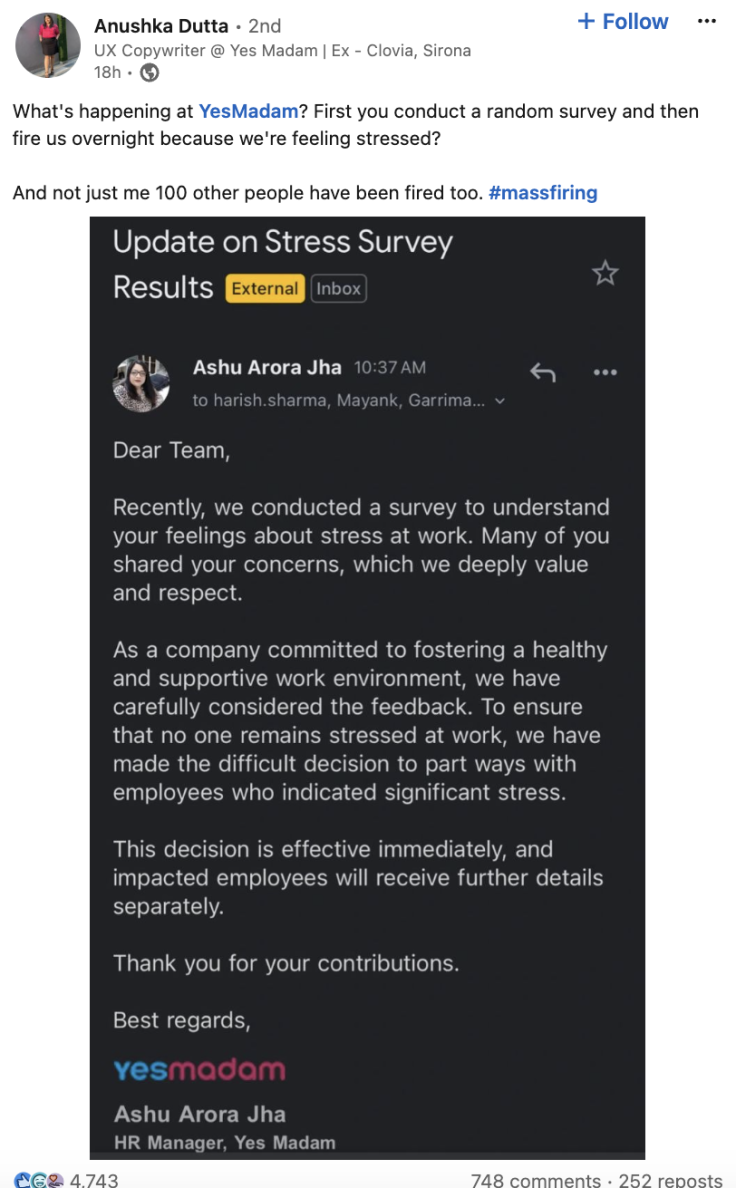YesMadam Layoffs Email a Hoax? Why the '100 Workers Laid off Due to Stress' Post May Be Fake

A recent social media storm erupted over allegations that YesMadam, an India-based beauty services platform, laid off 100 employees citing workplace stress. The viral post claimed the layoffs were a result of a stress survey conducted by the company. However, mounting evidence suggests the claims may be a poorly executed public relations stunt aimed at gaining attention, with critics and analysts raising questions about the authenticity of the narrative.
The Viral Post and Public Reaction
The controversy began with a LinkedIn post by a purported employee named Anushka Dutta, who shared an email allegedly sent by YesMadam's HR department. The email announced the termination of employees who had reported high stress levels in a recent workplace survey. The post quickly gained traction, sparking outrage and debates about workplace ethics.
According to her post, the email read: "To ensure that no one remains stressed at work, we have made the difficult decision to part ways with employees who indicated significant stress." The dismissals were described as effective immediately, and the affected workers were promised further details in follow-up communications.
Social media users lambasted the company, with one user labelling the move "the weirdest, most unethical reason for employee termination." Others speculated that the email might be part of a PR campaign gone wrong.
Critics Call Out Red Flags
While there have been several people online who've cried out, "Wolf!", a cybersecurity researcher on LinkedIn, who goes solely by "Akshay," posted an analysis of the viral email, pointing out out numerous inconsistencies suggesting it may not be legitimate. Some of his key observations include:
1. Email Inconsistencies: The email was allegedly sent through Google's GSuite platform but bore labels indicating it was from an external source, a mismatch for internal communications. Additionally, the sender's profile image and the email's font appeared to have been edited, raising suspicions of editing.

2. Unrealistic Claims: The claim that over 100 employees were terminated without a single corroborating post from the affected workers was seen as implausible. Scraping LinkedIn profiles of YesMadam employees failed to reveal any similar posts or grievances.
3. Contradictory Branding: The company name was inconsistently referred to as "YesMadam" and "Yes Madam" across various communications. Such discrepancies suggest a lack of attention to detail, uncharacteristic of a legitimate HR communication.
4. Labour Law Violations: Terminating employees en masse under such circumstances would likely violate labour laws and trigger regulatory scrutiny. Yet, no such legal action or public fallout has been observed.
5. PR Campaign Speculation: Critics noted that YesMadam offers stress-related therapy services, leading to speculation that the viral post was crafted to draw attention to its offerings. However, this alleged stunt appears to have backfired, damaging the brand's reputation rather than enhancing it.
6. Names Mentioned in the Email: Upon reviewing the names mentioned in the email, it was found that Ashu Arora Jha is the company's HR director, boasting over 10 years of experience in human resources. For a seasoned HR professional, a mistake of this magnitude (not using bcc for the email list) would appear unfathomable, though not entirely impossible.
Meanwhile, "Mayank" refers to YesMadam's Founder and CEO, Mayank Arya, while "Garima" is identified as the company's director. It is also noteworthy to point out that the only person who's posted their grievance about the email is the company's UX copywriter, Anushka Dutta, who makes a living crafting viral content.

The Bigger Picture
While YesMadam has not released an official statement addressing the viral post, analysts and experts caution against exploiting sensitive topics like workplace stress for publicity. Such actions can undermine trust in workplace surveys and employee feedback mechanisms, potentially discouraging honest communication in professional settings.
As speculation continues, the incident serves as a reminder of the thin line between clever marketing and reputational damage. If this was indeed a PR stunt, it highlights the pitfalls of sensationalism in corporate branding efforts. Ultimately, organisations must prioritise authenticity and integrity to maintain credibility with their audience and workforce.
Whether the viral post is genuine or a calculated move, it has certainly sparked a larger conversation about workplace culture and mental health.
© Copyright IBTimes 2025. All rights reserved.





















